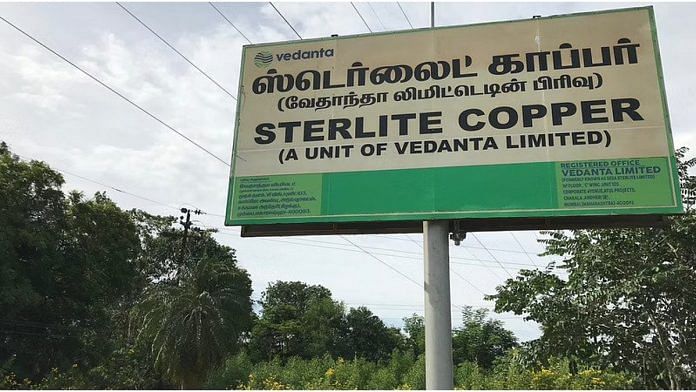New Delhi: The closure of the Sterlite copper plant in Tamil Nadu’s Thoothukudi in May 2018 is likely to have cost the Indian economy over Rs 14,000 crore, according to a study done by a Rajasthan-based NGO, Consumer Unity & Trust Society (CUTS) International.
The plant was shut down after protests alleging environmental violations, lasting for 100 days, turned violent and a police firing on 22 May 2018 left 13 people dead and over 100 injured.
“Through the data collected and analysed for the purpose of this report, the consolidated loss to the economy owing to closure of the copper plant by all stakeholders is estimated to be around Rs 14,749 crore since its closure in May 2018. The cumulative loss for the entire period of plant closure is roughly around 0.72 per cent of the State Gross Domestic Product (SGDP) of Tamil Nadu,” said the study, publicly released in June.
Financed by the government think-tank NITI Aayog, the study looks to assess the direct and indirect economic impact of the select judicial decisions of the Supreme Court and the National Green Tribunal (NGT). For the purpose of the study, CUTS — an NGO pursuing social justice and economic equity — has selected five cases where the Supreme Court’s and NGT’s decisions have led to a huge impact on the economy.
According to the study, one of the major impacts of the plant shutdown was on the employment of the local population, with various media reports highlighting the net loss of employment (both direct and indirect) at almost 30,000 jobs. Moreover, the closure is expected to have reduced the monthly incomes of those who lost jobs by at least 50 per cent while leaving many jobless, the study said.
Established in 1994, the plant was run by Sterlite Industries, a unit of Vedanta Ltd. The protestors in 2018 wanted the copper smelting unit to shut down, accusing Sterlite of being lax regarding environmental regulations, damaging the health of local people in and around the port town of Thoothukudi.
Following the violence, the Tamil Nadu Pollution Control Board (TNPCB) and the state government ordered the permanent closure of the plant with immediate effect.
TNPCB’s closure order was challenged by Sterlite in the National Green Tribunal (NGT) in November 2018, following which the tribunal ordered the reopening of the plant. However, the order was dismissed by the Supreme Court in 2019, on the grounds that that the NGT had no jurisdiction to entertain appeals against the state government’s orders.
In August 2020, the Madras High Court upheld the orders of the TNPCB and the Tamil Nadu government. The SC denied any interim relief to Sterlite in December that year.
At the peak of the second wave of the Covid pandemic in May 2021, the Tamil Nadu government allowed the plant to operate for four months to produce medical oxygen.
Also Read: In Tuticorin, Sterlite Copper is slogging to cope with new medical oxygen supplier avatar
Impact on downstream businesses, capital spending
Through its study, CUTS also sought to establish the indirect impact that the Indian economy faced since the plant shutdown in terms of job losses, and losses suffered by stakeholders connected to the plant.
The study found that around 400 downstream businesses were associated with the copper plant, employing approximately 1,00,000 people who were affected by the closure of the plant. “The net estimated impact on all the downstream businesses in terms of their cost of procurement stands at around Rs 491 crore since the closure of the copper plant,” the report said.
Another objective of the report was to assess the quantum of revenues that were lost with the plant shutdown, and the impact of this on the government’s capital spending.
The report takes a capital expenditure multiplier to estimate the induced economic impact of the five cases, including the Sterlite plant closure, mentioned above. It assumes a capital expenditure multiplier of 2.45, meaning that the economy gains Rs 2.45 on every Re 1 spent by the Indian government for public utilities.
“The crux of this report was a more informed and evidence-based approach to judicial decisions,” Amol Kulkarni, director-research at CUTS International, told ThePrint.
Vedanta scouting buyers for plant
Due to the losses it has faced as a result of the shutdown, Vedanta is in the process of selling the copper plant. According to chairman Anil Agarwal, the company has received bids from seven players.
In an interview with Business Standard, Agarwal said the protests against the plant for alleged environmental damage were “political or NGO-driven”, and maybe funded by “Chinese”.
“For us, the most important thing is to get clearance so that the company can start. We are talking to prospective buyers and have got bids from seven players — both international and domestic. They have found that on the ground, things have become more positive,” Agarwal told Business Standard.
“I only know that India cannot afford to stop this plant. They can bring more regulations. It is a nation’s loss, job loss, and revenue loss. We have Sesa Goa, where the government has lost almost $30 billion. Most of this is NGO-driven.”
The size of the Indian copper industry (consumption of refined copper per annum) is around 6.6 lakh tonnes, which as a percentage of the world copper market is only 3 per cent, according to a report of the Ministry of Mines. Madhya Pradesh accounts for the largest reserve of copper ore in India, followed by Karnataka, Rajasthan, and Jharkhand.
(Edited by Tony Rai)
Also Read: In Haryana tragedy, deadly mix of ‘illegal mining’, disputed leases & a village of dependents



